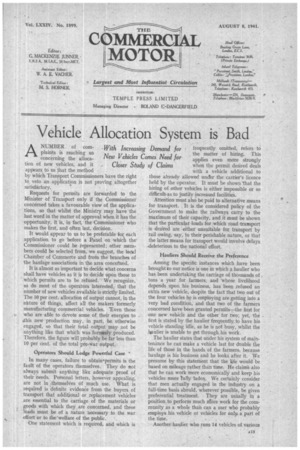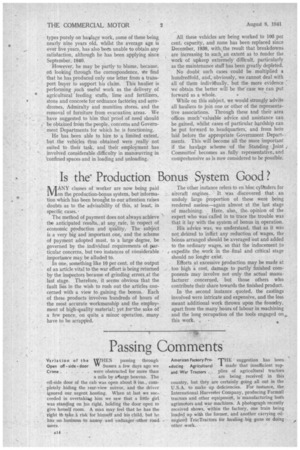Vehicle Allocation System is Bad
Page 15

Page 16

If you've noticed an error in this article please click here to report it so we can fix it.
ANUMBER of complaints is reaching us concerning the allocation of new vehicles, and it appears, to us that the method by which Transport Commissioners have the right to, veto an application is not proving altogether satisfactory.
Requests for permits are forwarded to the Minister of Transport only if the Commissioner concerned takes a favourable view of the applications, so that whilst the Ministry may have the last word in the matter of approval when it has the opportunity, it is, in fact, the -Commissioner who makes the first, and often last, decision.
It would appear to us to be preferable for each application to go before a Panel on which the Commissioner could be represented; other members could be selected from, we suggest, the looal Chamber of Commerce and from the branches of the haulage associations in the area concetned.
It is almost as important to decide what concerns shall have vehicles as it is to decide upon those to which permits are to be refused. We recognize, as do most of the operators interested, that the number of new vehicles available is strictly limited. The 10 per cent. allocation of output cannot, in the nature of things, affect all the makers formerly manufacturing commercial vehicles. 'Even those who are able to devote some of their energies to .this new production may, in part, be otherwise engaged, so that their total output may not be anything like that which was• formerly produced. Therefore, the figure will probably be far less than 10 per cent. of the total pre-War output.
Operators Should Lodge Powerful Case In many cases, failure to obtain•permits is the fault of the operators themselves. They do not always submit anything like adequate proof of their needs. Personal letters, however appealing, are not in !themselves of much use, What is required is definite evidence from the buyers of transport that additional or replacement vehicles are essential to the carriage of the materials or goods with which they are concerned, and these ' loads Mist be of a nature necessary to the war effort or to the 'welfare of the public.
One statement which is required, and which is frequently omitted, refers to. , the matter of hiring. This applies even metre strongly when the permit desired deals with a vehicle additional to those already allowed uncrer the carrier's licence held by the operator. It must be shown-that the hiring of other vehicles is either impossible or so difficult-as to justify increased facilities.
Attention must also be paid to alternative means for transport. It is the considered policy of the Government to make the railways carry to the maximum of their capacity, and it must be shown that the particular loads for _which road transport is desired are either unsuitable for transport by rail owing, say, to their perishable nature, or that the latter means for transport would involve delays -deleterious to the national effort.
g Demand for Comes Need for y of Claims
Hauliers Should Receive the Preference Among the specific instances which have been brought to our notice is one in which a haulier who has been undertaking the carriage of thousands of, tons 'a year for farmers, and whose livelihood depends upon his business, has been refused an extra new vehicle, despite the fact that two out of the four vehicles he is employing are getting into a very bad condition, and that two of the farmers concerned have been granted permits--the first for one new vehicle and the other for two; yet, -the first is stated by the haulier frequently, to have his • vehicle standing idle, as he is not busy, whilst the ltaulier is unable to l'a-et through. his work.
The haulier states that under his system of maintenance he can make a vehicle last for double the life of those in the hands of the farmers, because haulage is his business and he looks after it. We presume by this statement that the Life would be based on mileage rather than time. He claims also that he can work more economically and keep his vehicles more 'Tully iaden_. We certainly consider that men actually engaged in the industry on a full-time basis should, wherever possible, be given preferential treatment. They are usually in a position.to perform much rtiOre work for the community as a whole than can a. user who probably' employs his vehicle or vehicles for only a part of the time.
Another haulier who runs 14 vehicles of various types purely on havlage work, some of these being nearly nine years old, whilst the average age is over five years, has also be unable to obtain any satisfaction, although he has been applying since September, 1940.
However, he may be partly to blame, because, on looking' through the correspondence, we find that he has produced only one letter from a transport buyer to support his claim. This haulier is performing /such useful work as the delivery of agricultural feeding stuffs, lime and fertilizers, stone and concrete for ordnance factories and aerodromes, Admiralty and munition stores, and the removal of furniture from evacuation areas. We have suggested to him that proof of need should be obtained from the people, concerns and Government Departments for which he is functioning.
He has been able to hire to a limited extent, but the vehicles thus obtained were really not suited to their task, and their employment has involved considerable difficulty in manceuvring in 'confined spaces and in loading and unloading. All these vehicles are being worked to 100 per cent. capacity, and none has been replaced since December, 1938, with‘the result that breakdowns are increasing to such an extent as to fender the work of upkeep extremely difficult, particularly as the maintenance staff has been greatly depleted.
No doubt such cases could be multiplied a hundredfold, and, obviously, we cannot deal with all of them individually, but the more evidence we obtain the better will be the casewe can put forward as a whole.
While on this subject, we would strongly advise all hauliers to join one or other of the representative associations. Through these and their area offices much' valuable advice and assistance can be gained, whilst cases of particular hardship can be put forward to headquarters, and from here laid before the appropriate Government Departments. This will become all the more important if the haulage scheme -of the Standing Joint , Committee becomes as fully representative, and comprehensive as is now considered to be possible.




















































